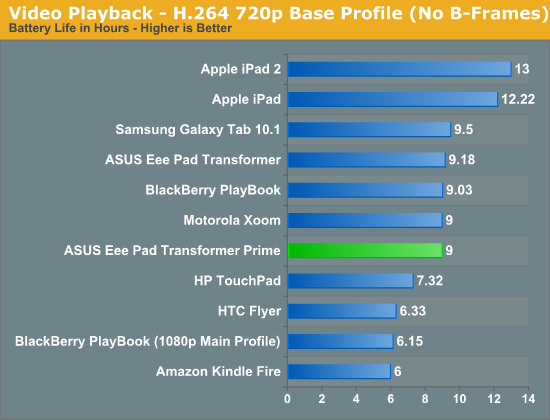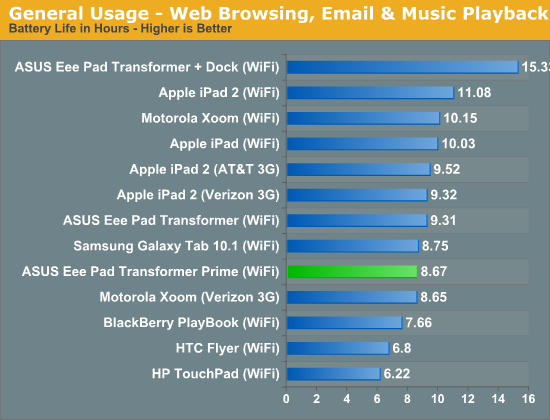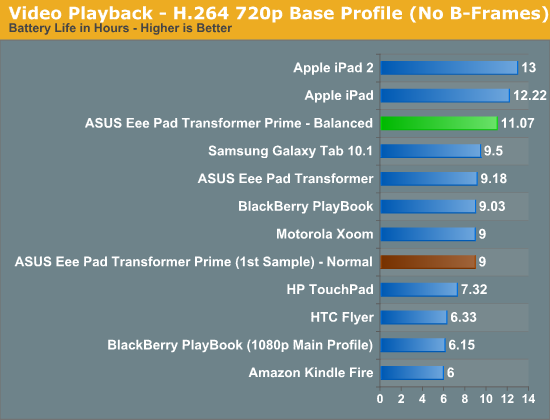ASUS Eee Pad Transformer Prime & NVIDIA Tegra 3 Review
by Anand Lal Shimpi on December 1, 2011 1:00 AM ESTBattery Life
With 39 hours to test I was pretty limited in what I could do when it came to battery life testing. I was able to run through two tests (one run a piece) and only in one configuration each. I wanted to see how Tegra 3 and the Prime fared in the worst case scenario so I picked the Normal power profile. Over the coming days I'll look at battery life in the other two profiles as well, not to mention run through more iterations of our test suite.
My bigger concern has to do with the malfunctioning WiFi in my review unit. For our video playback battery life test WiFi was on but not actively being used, those numbers should be ok. It's our general use test that loads web pages and downloads emails over WiFi and it's there that I believe things could've suffered a bit.
In both cases I saw around 9 hours of continuous battery life out of the Transformer Prime, without its dock. These numbers are a bit lower than the original Transformer but it's unclear to me how much of this is due to the additional cores/frequency or the misbehaving WiFi. The fact that we're within striking range of the original Transformer with the Prime running in Normal mode tells me that it's possible to actually exceed the Transformer's battery life with the Balanced or Power Saver profiles. That's very impressive for an SoC built on the same manufacturing process as its predecessor but with twice the CPU cores and a beefier GPU.


What I'm not seeing however is the impressive gains in battery life NVIDIA promised its companion core would deliver. I'm not saying that the companion core doesn't deliver a tangible improvement in battery life, I'm just saying that I need more time to know for sure.
That the Transformer Prime can deliver roughly the same battery life as its predecessor without any power profile tweaking may be good enough for many users. Both ASUS and NVIDIA shared their own numbers which peg the Prime's battery life in the 10 - 13 hour range. As I mentioned before, I'll have more data in the coming days.
Update - With a replacement Transformer Prime in house, battery life is looking a lot better already:

Update 2: Even more battery life results in our follow-up.










204 Comments
View All Comments
Tchamber - Thursday, December 1, 2011 - link
I'm glad you brought up the fact that the Prime has a higher resolution than the iPad2, I think a lot of people overlook that when then see performance numbers. This seems to be the tablet I wanted when I bought my 1st gen iPad, if I like it, I'm done with Appletunes. Thanks for the good review.tim851 - Thursday, December 1, 2011 - link
They were reviewed at the same resolution(s)...hakimio - Thursday, December 1, 2011 - link
CNET reviewers also got a unit with defective WIFI. So don't worry - you are not alone.Morelian - Thursday, December 1, 2011 - link
Nice review. As an original Ipad owner I am always interested in new tablets but so far nothing since the original Ipad would get me to replace my current tablet. I did get my wife an Ipad 2 and while it is speedier the function of my original product still holds up.I really don't get the back camera on these things-a tablet is too big to really use as one's camera of choice and if you have a tablet surely a phone would be preferable? The front facing cam I understand and that would let people do the facetime/skype thing which I see as potentially useful.
I take my Ipad to work with me. When I have spare time, I'll use it to check my email-much easier to read on the Ipad than my phone and the Ipad facebook app is pretty good. If things get really slow I can open a book and read. Rarely I'll watch something on Netflix but currently I don't have Netflix going because the kids grab the Ipad at home and watch cartoons instead of doing homework.
As to doing work I just don't see it. A few months ago I got a Toshiba 14 inch laptop from Best Buy for 500 bucks. My thought was if I got good use out of it I'd get a Macbook Air and toss the laptop to the kids but technical limitations at work prevent me from doing what I'd really like with the notebook. The Toshiba laptop has an Intel processor with the Intel graphics, I doubt it could game and never tried, but it tosses up web pages nicely and has a nice keyboard. I can do work on it and don't mind typing on it. To do work I need Windows compatibility and I can't see where the Asus tablet would help me there.
So, I don't really get this docking station except for a way for Asus to make a few extra bucks for people who don't know what they want to use a tablet for. To me a tablet is something lightwight you use for data consumption, and for "work" you need something that runs Windows software and is reasonably designed for data entry.
The Windows 8 tablets might be the place where things are headed but a Win8 tablet with a docking station keyboard is a notebook.
I guess we'll see where all is headed.
efficacyman - Monday, December 5, 2011 - link
The rear facing camera can be used for scanning in documents using google documents or other scanning applications. The better the quality of the camera, the better the quality of the resulting product. The best camera you have is the one you have with you all the time. If you are using your tablet as your work machine, having a camera with you that is high quality can't hurt.Stupido - Thursday, December 1, 2011 - link
I'm not following this tablet development much, but I kind a like the "tablet idea"...But so far I haven't seen any tablet with USB support. Is this notion OK or I'm missing something?
Death666Angel - Thursday, December 1, 2011 - link
If by USB support you mean USB host capabilities (as in, you can plug a USB stick in and read data off it), every modern tablet/smartphone I know can do that, except Apple iStuff.Mice, gamepads, printers etc. are a more complicated matter.
Stupido - Thursday, December 1, 2011 - link
By complicated matter I guess you refer to the driver level of the OS?Because once you have USB host, than I guess it will be up to the OS to provide the correct drivers?
I don't know how different are the kernels (and their corresponding driver architecture) between Android and Linux...
I just know that Android is a fork of the standard Linux kernel...
Death666Angel - Thursday, December 1, 2011 - link
Yup, driver implementation and program support was what I was getting at. :-)If you are interested in that sort of stuff, XDAdevelopers is always a great place for any smartphone/tablet questions of a technical nature.
Stupido - Friday, December 2, 2011 - link
Thx! I'll check that...